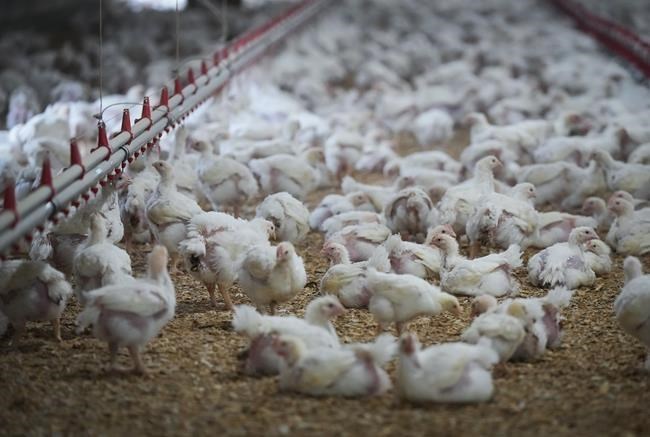
Chickens are seen at a poultry farm in Abbotsford, B.C., on Thursday, November 10, 2022. THE CANADIAN PRESS/Darryl Dyck
Republished February 19, 2025 - 12:03 PM
Original Publication Date February 19, 2025 - 9:41 AM
The federal government says it has purchased 500,000 doses of a bird flu vaccine as a proactive measure, pointing to guidance that says high-risk people should be prioritized for the shot, such as farm workers exposed to infected animals.
The Public Health Agency of Canada says risk to the general public is low and that broad vaccinations are not recommended, citing guidance from the National Advisory Committee on Immunization on the use of GSK's human vaccine against avian influenza.
The shot is meant for people who may be at increased risk, such as those who have ongoing contact with infected animals and their environments.
"While the current risk to the public remains low, individuals with higher-level exposure to infected animals are at increased risk and should take appropriate precautions," PHAC said in a statement issued Wednesday.
Provinces and territories are set to receive 60 per cent of the available doses and will decide how to use them, PHAC said, while the remainder will be kept in a federal stockpile.
NACI, which provides guidance on vaccine use in Canada, said the vaccine — called Arepanrix — can be offered as a two-dose series to individuals six months of age and older in specific circumstances.
It identified several groups considered at higher risk "in a non-pandemic context," among them: people who handle live avian influenza virus in laboratory settings; people with ongoing contact with infected birds or other infected animals or their environments, and people who work or live on farms with geographic or other connection to farms experiencing outbreaks.
Health Minister Mark Holland said Wednesday in PHAC's release that buying the vaccines is among the government's "proactive steps" to prepare for the threat of H5N1 spread.
The announcement comes after experts last year urged greater preparedness measures, including increased flu surveillance, early detection and vaccine availability.
In response, PHAC said last November that it was not stockpiling H5N1 vaccines because "the shelf-life of the vaccines is only up to two years."
PHAC said Arepanrix is based on technology for seasonal and pandemic influenza vaccines, and that Health Canada authorized the vaccine strain change after completing a review on Feb. 18.
Canada reported its first domestically acquired human case of bird flu on Nov. 9, 2024. The teenage patient became very ill, and spent two months in a B.C. hospital. She was discharged in January and authorities said they do not know how she was infected.
Person-to-person transmission of H5N1 is considered very rare.
But ongoing outbreaks among farm animals in the U.S and Canada have heightened concerns about the potential for broader spread.
On Wednesday, the Canadian Food Inspection Agency website listed about 35 premises across the country with infected birds, most of them in British Columbia.
This report by The Canadian Press was first published Feb. 19, 2025.
News from © The Canadian Press, 2025